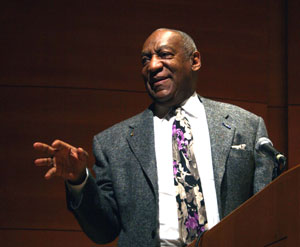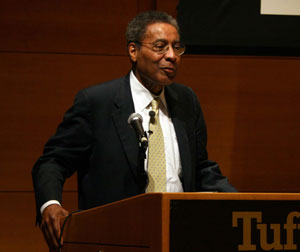
Bill Cosby took the stage along with friend and professor Alvin Poussaint to accept the Eliot-Pearson Award for Excellence in Children's Media. - Photo by Andrew Firestone
Bill Cosby honored for decades of family friendly media
*
By Andrew Firestone
Students at Tufts were treated to an enduring American personality when legendary comedian Bill Cosby took the stage along with friend professor Alvin Poussaint to accept the Eliot-Pearson Award for Excellence in Children’s Media.
Along with the Harvard Professor Poussaint, Cosby’s presence proved to be an inspirational one, as he reminded the students to work hard to improve their world.
“[Tufts] is appreciated and respected all over. I don’t know why you came here, maybe you didn’t like your parents, you just wanted them to pay for it,” he said.
“It is important for you to accept the challenge, to make a change,” said Cosby. “If you don’t open your mouth and talk when you hear something; when you hear people saying things you don’t agree with and do not respond in a way of saying ‘you’re wrong’ you’re not doing anything! You’re helping apathy grow.”
The award is presented every two years to individuals who have worked in children’s media “appropriately pitched for children at different development levels,” said Media Studies director Julia Dubrow. “We look for media that are free of gender, ethnic or racial stereotyping.”

Child psychiatrist Alvin Poussaint and Cosby worked together to give long running sitcom “The Cosby Show” a fair and uncluttered depiction of African-American life. - Photo by Andrew Firestone
Poussaint and Cosby worked together to give long running sitcom “The Cosby Show” a fair and uncluttered depiction of African-American life. Poussaint, a Harvard University child psychology professor, has also worked in the field for many different programs.
“Media is of course, very, very important. It can do good things, and it can do bad things,” he said. Poussaint referenced the American Society of Pediatrics, and their recommendation that children two and under not have any screen time at all. “They feel that focus on media interferes with the development of the brain because children are not playing enough.”
Cosby said that he did not know what psychiatrists actually did. When congratulating Poussaint, he let him know that he thought the speech was only “so-so.”
During his acceptance speech, Cosby brought onstage Tufts graduate Delis Etienne, a young Haitian who had overcome surgically induced blindness in order to study. Etienne recalled when he told his mother of his decision to transfer there. “She said ‘do you know where is Tufts?’ I said ‘I don’t know.’”
“Your mother can see, right,” quipped Cosby, “so she knows you’re blind?”
Cosby, who attended UMass, recalled that the Dean of the School of Education, Dwight Allen, had personally sent him on his way by encouraging him with his monologues. Cosby credited Allen with giving him “the chance to put my information out but with a spin that had to do with highlighting more my interest in education. Getting children to be more involved and the family.”
“This is why I am, at the age of 73, who I am,” he said.
Cosby ended the speech, with encouragement. “Alvin and I are not going to die,” he said. “And we are not going to become people who have dementia. We will stay clear forever. So don’t think that you wait for us to die, then come in. No, you come on right now.”
Poussaint, when asked what he believed the correct methods of children’s education were, said “I think we have to be very activist, creative and innovative, almost like a movement really with really holistic comprehensive [approach] to try to salvage every kid we can and give them an education. That’s critical I think, if we’re going to deal with all the other social problems that we have in the United States,” he said.















Reader Comments